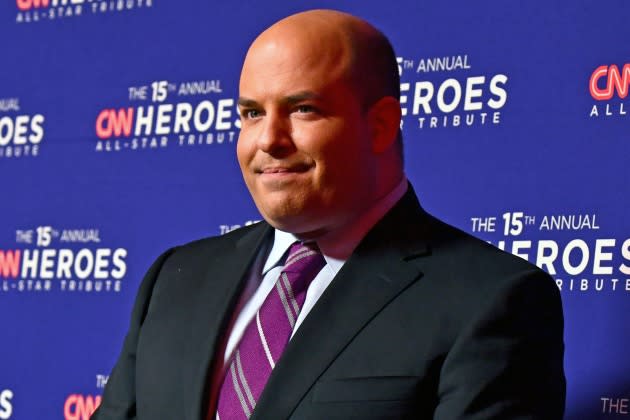With Brian Stelter’s ‘Reliable Sources’ Canceled, Who’s Left to Keep Tabs on the Media?
- Oops!Something went wrong.Please try again later.
- Oops!Something went wrong.Please try again later.
- Oops!Something went wrong.Please try again later.
- Oops!Something went wrong.Please try again later.

When Brian Stelter signed off from the last installment of CNN’s “Reliable Sources” Aug. 21, the number of mainstream vehicles analyzing an increasingly confusing media industry shrank even further.
Stelter bid farewell the same day Washington Post media columnist Margaret Sullivan ended her run — asking such notables as Carl Bernstein and Jeffrey Goldberg on air whether the press is doing enough to cover topics ranging from disinformation to climate change. The lead story of his hour was a dire one: his program’s own cancellation after three decades. “It’s going to be on you to hold CNN accountable,” Stelter told viewers in the show’s waning moments, later adding: “The free world needs a reliable source.”
More from Variety
Why did CNN terminate a show that has been on its Sunday schedule since the early 1990s? Since acquiring the company once known as WarnerMedia, executives at new corporate parent Warner Bros. Discovery have been eager to steer the popular news outlet to less rocky terrain. Under former chief Jeff Zucker, CNN anchors were given leeway to show passion and express opinion on hot news topics. New leader Chris Licht has vowed to rein that in.
In doing so, however, CNN is tossing out a program launched with the best of intentions. Bernard Kalb first anchored the show, followed by Howard Kurtz and, in 2013, Stelter, a former New York Times reporter who worked closely with late media columnist David Carr. “This show was founded by Ted Turner and leaders of CNN who felt very deeply that media organizations have a responsibility to report and to evaluate the journalism profession itself,” said Tom Johnson, a former CNN CEO, on Facebook over the weekend. “Are we accurate? Are we fair? Are we responsible?”
Keeping tabs on the media is growing exponentially more difficult in the digital age. The media has become more reliant on algorithms, social-media responses and smartphone screens, making the task of holding news outlets to account a more arduous one.
Margaret Sullivan, a popular media critic and columnist, is leaving The Washington Post for academia, and The New York Times has yet to replace its own media columnist, Ben Smith, though there has been some puckish speculation in recent weeks about who might be considered for the job.
“I wrote recently about the end of a number of forums for media criticism, and there really was no common thread at all, ranging from cancellation to retirement to death,” says Dan Kennedy, a former media critic for the now-defunct Boston Phoenix and currently a journalism professor at Northeastern University’s College of Arts, Media and Design. “But I don’t have the sense that we’re going to see replacements for any of these outlets.”
CNN has said it will continue the “Reliable Sources” newsletter, which Stelter launched, under reporter Oliver Darcy. Even so, the digital publication is on a summer hiatus while it is being retooled. And other media critics — like Politico’s Jack Shafer and The Washington Post’s Erik Wemple — continue to hold forth, while Kurtz hosts Fox News Channel’s “MediaBuzz” on Sundays.
In an era when media companies are growing more concerned about their ability to lure the masses of people who once tuned in to “M*A*S*H” and “Gunsmoke,” media-on-media chatter may hold less interest to the companies that might feature it on their schedules. The shows have narrower appeal — the people who care most about what’s happening in the media are the people who work in the industry — and aren’t as immediately relevant as the outbreak of war or a major national election. Even so, “Reliable” in recent weeks won the biggest audience on CNN’s Sunday daytime schedule among people between 25 and 54, the audience most coveted by advertisers in news programming.
It’s no secret that Warner Bros. Discovery is under tremendous pressure to reduce debt and find cost savings. Earlier this year, CNN boss Licht spoke about a revamped block of Sunday programming that would include a new show from Chris Wallace as well as a newsmagazine. Both could be seen as the sort of “premium” programming CNN sponsors might love.
But news divisions have long offered a public service: informing viewers and helping them to make critical decisions about the world around them. That doesn’t always make the cash register ring.
“I suppose in some ways we’re awash in media criticism today,” says Kennedy, referencing outlets like Twitter and Reddit. But, he adds: “What we lack are people who are paid full time to examine the media, which I think is crucial to democracy.”
VIP+ Analysis: Why Cable News Has a Big 9 P.M. Problem
Best of Variety
Sign up for Variety’s Newsletter. For the latest news, follow us on Facebook, Twitter, and Instagram.
